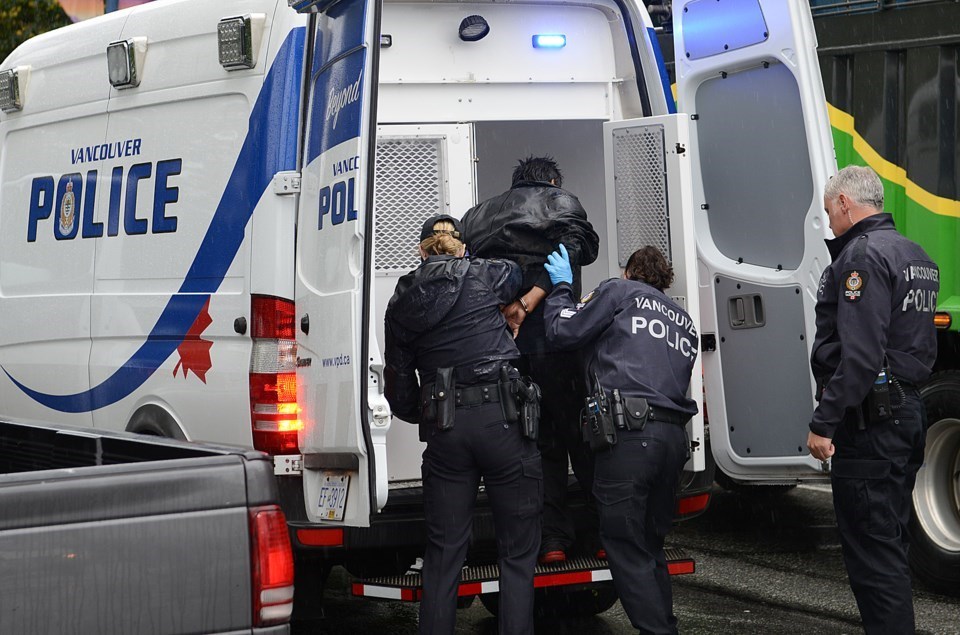At 61, Frank Young is not in the best of health.
The retired logger from Haida Gwaii has a history of heart failure and is battling lung cancer.
He is also hampered by obstructive pulmonary disease, coronary artery disease and atherosclerosis.
Add it all up and Young’s combination of poor health conditions puts him at “extreme risk of death from exposure to COVID-19 illness or other transmissible infections such as influenza,” according to Dr. James Chrones of the Haida Gwaii Hospital & Health Centre.
So what is Young doing in prison, then?
A recent 72-page ruling from Prince Rupert Provincial Court Judge David Patterson provides the long answer.
The abridged version is police in Skidegate arrested Young in February 2019 for possession of three ounces of cocaine for the purpose of trafficking. He was subsequently sentenced Jan. 15 to a year in custody, followed by two years of probation.
His case is unique in the time of COVID-19.
In a province that has seen infection rates climb since the summer, and more than 1,000 people die of COVID-19, the likelihood of a convicted criminal with underlying health conditions being infected from the virus in a jail is now an additional consideration for a sentencing judge.
The concern of Young contracting the virus in an institution is why his lawyer, Bill Sundhu, argued for a suspended sentence, providing letters from doctors to the court, including Chrones’ assessment of Young’s vulnerability.
“I am highly concerned about the risks of an infection spread in an institutional setting, especially where many younger, healthier men live close together,” Chrones wrote.
“Such a population will be less likely to show illness severe enough to trigger recognition and isolation measures early enough to stop its spread to those such as Mr. Young, who are extremely vulnerable to the severe life-threatening outcomes.”
Sundhu told Glacier Media he wouldn’t have argued for a suspended sentence in pre-pandemic times, noting the normal range for a first time drug trafficker is between six months and 18 months in prison. This was Young’s first drug offence.
“But for his medical condition, I would have not made that submission,” he said of his request for a combination of probation and house arrest.
“It’s up to the reasonable-minded member of the public to say, ‘He deserved what he got, or he didn’t.’ But it’s my ethical responsibility to raise these issues with the court and advocate on behalf of my client.”

New outbreak at Surrey Pretrial Services Centre
Prisoners in B.C. and across the country have not been immune to COVID-19, with data dated Jan. 20 from Correctional Service Canada showing 1,231 inmates had tested positive for the virus and four have died.
In B.C.’s 10 federal facilities, 125 prisoners had tested positive, with 120 at Mission Institution, where one inmate died last year. At least 15 staff had also tested positive at the medium-security facility during the outbreak last spring.
The latest data shows no active inmate cases at Mission or B.C.’s other federally run prisons, but 27 in the country’s other institutions. Correctional Service Canada said in an email Wednesday there are 35 active cases among staff in the country.
As for B.C.’s 10 provincial prisons, which includes the undisclosed facility where Young currently resides, 36 inmates and 35 staff had tested positive for COVID-19 since the pandemic was declared in March 2020.
None of the 71 people required hospitalization, according to information provided to Glacier Media from B.C.’s Ministry of Public Safety and Solicitor General. The number of positive cases recorded as of Jan. 18, 2021 includes previous outbreaks at the Okanagan Correctional Centre and North Fraser Pretrial Centre.
The statistics do not include the latest outbreak announced Wednesday at the Surrey Pretrial Services Centre, where public health teams from Fraser Health are contact tracing and working with BC Corrections to prevent further transmission of the virus.
Judge Patterson did not have such data before him in sentencing Young to a year in prison but acknowledged the 61-year-old’s “ongoing health issues and the dangers to you if you contract COVID-19.”
At the same time, he pointed out the Provincial Health Services Authority provides health care to all inmates once they are admitted into one of B.C.’s 10 provincial prisons, and ensure “all incarcerated persons receive the same quality of care as they would in the community.”
In the end, Patterson concluded a one-year jail sentence “does not result in a substantial risk that you will contract COVID-19, or not live out your sentence.” Patterson said any lesser sentence would bring the administration of justice into disrepute and be contrary to the public interest.
“In other words,” he said, “an unfit sentence.”
‘Get out of jail free card’
Coincidentally, the day after the first day of Young’s sentencing hearing, the B.C. Court of Appeal released a decision on a case involving Michael McKibbin, a 62-year-old Terrace man caught in a sting operation with three small packages of cocaine.
McKibbin was sentenced in January 2020 to six months in jail.
At the time, he suffered from chronic obstructive pulmonary disease, more commonly known as COPD. His condition worsened and his lawyer successfully argued that McKibbin be released on bail in March until his appeal could be heard.
The appeal was based on McKibbin being too ill to serve six months in prison and concerns over contracting COVID-19.
“If it were not for the unusual global circumstances currently existing, I would see no basis to interfere with that sentence,” wrote Madam Justice Elizabeth Bennett in her Nov. 18 ruling, which was agreed to by two other appeal court judges.
“However, a current medical report, taken into consideration with the serious conditions in British Columbia due to the COVID-19 pandemic, demonstrate that Mr. McKibbin’s health is seriously compromised. As a result, I would allow the appeal and order that the six months’ imprisonment be suspended, and place Mr. McKibbin on probation for the remainder of his sentence with strict terms.”
The McKibbin case is one Patterson considered in sentencing Young but said he did not take Bennett’s ruling to mean that 100 per cent of the time an offender with pre-existing health conditions should be kept out of jail.
Such a rule, he said, would “create havoc on our society, as offenders with pre-existing health issues who are very vulnerable to severe health consequences, including premature death should they contract COVID-19, would have the ultimate ‘get out of jail free’ card.”
Patterson also took into account a community impact statement provided by Skidegate Band councillor Michelle McDonald, who requested Young serve time in jail. Young, who has lived on Haida Gwaii since he was 12, is not Indigenous, but his stepfather is.
McDonald described how neighbours were afraid of Young, who has a long history of drug and alcohol addiction. Another band councillor described Young as “the patriarch of one of the major trafficking families” in Skidegate.
“Elders, youth and families are fearful of the accused and the type of people that are at the [Youngs’] home,” McDonald told the court.
“They fear retaliation when they speak out. They do not want contact with the offender. They also have to worry about theft and vandalism in regards to the desperation that exists from people trapped in the scourge of addiction. They fear for young people who visit — that they will be exploited or preyed upon in the context of drug use, or trading favours for drugs.”
Pandemic prompts federal prosecutors to review policies
The prosecutor in Young’s case, F.A. Switzer, would have been guided by a memo issued in March 2020 by the deputy directors of the Public Prosecution Service of Canada, which is responsible for prosecuting drug cases.
The memo concerned the handling of cases in the time of COVID-19.
In an emailed statement, the federal agency explained that early on in the pandemic it reviewed its policies on bail, resolution and sentencing.
“We recognized that those with compromised immune systems required particular consideration and wherever possible — having regard to the nature of the criminal conduct alleged and the information about their health — should be candidates for alternate means of addressing bail, and even sentencing considerations,” the agency said.
“To the extent possible, those incarcerated during the pandemic should be the most serious offenders and/or those who have committed the most serious offences. When a short sentence is considered, a conditional sentence or even a suspended sentence with house arrest may be appropriate rather than a sentence of two or three months.”
Despite these considerations, the agency pointed out it is ultimately up to the court to decide whether an individual is guilty or not, as well as what sentence should be imposed. Patterson’s written reasons for sentencing showed no indication Switzer was prepared to keep Young out of jail.
She requested a one-year jail term, followed by a term of probation, a forfeiture order for cash and drug paraphernalia seized during Young’s arrest and a DNA order — all of which the judge granted.

Prison population reduced by hundreds
Daniel McLaughlin, communications counsel at the B.C. Prosecution Service, said in an email that Crown prosecutors were not given directives “to address sentencing in light of the current pandemic.”
McLaughlin said sentencing positions are informed by careful review of the available evidence and guided by the law as set out in the Criminal Code of Canada and applied by the court in other cases.
“In each case, the Crown must consider the personal circumstances of the accused and the relevant aggravating circumstances in order to craft an appropriate sentencing submission, once which balances the various sentencing objectives set out in the Criminal Code,” he said.
The sentence, he added, must be consistent with sentences imposed in B.C. for similar offences committed in similar circumstances, and must appropriately reflec t the seriousness of the offence and the degree of responsibility of the offender.
Documents obtained from the Ministry of Public Safety and Solicitor General show a substantial decline in the number of inmates in B.C. since the pandemic was declared in March, when approximately 2,200 people were in custody.
That population decreased to between 1,400 and 1,500 by mid-June. The current daily count is approximately 1,550 and continues to gradually increase as courts resume their regular operations, the ministry said in an email.
The ministry said the decrease relates to the courts prioritizing trials and sentencing, individuals completing existing sentences and fewer admissions into custody.
The decrease also factors in inmates released on temporary absences. Between mid-March and mid-June, about 25 individuals, all with fewer than 60 days left of their sentences, were assessed as appropriate for release on a temporary absence.
No recent data on temporary absences was provided.
To prevent transmission of the virus, BC Corrections has implemented a variety of measures including physical distancing, limiting movement of inmates between prisons, ongoing monitoring of inmates for COVID-19 symptoms and banning in-person visits, unless for urgent or exceptional circumstances.
“The reduction in the number of incarcerated people has further facilitated physical distancing,” the ministry said. “However, in some instances, double-bunking is occasionally required.”
3,973 COVID-19 cases linked to prisons
Keeping a close eye on the number of COVID-19 cases in the country’s prisons is Justin Piche, an associate professor in the criminology department at the University of Ottawa.
Piche is also a member of the Prison Pandemic Partnership, a research and advocacy project involving the University of Ottawa, University of Winnipeg and Canadian Civil Liberties Association.
Piche has kept a blog that tracks the number of COVID-19 cases connected to the country’s provincial and federal prisons. Tabulating data publicly available on government websites coupled with media reports, Piche estimated Wednesday there were 3,973 COVID-19 cases linked to Canada’s federal and provincial prisons, including inmates and staff.
That data didn’t include the 71 cases in B.C.’s provincial prisons, which was information provided to Glacier Media this week. The ministry did not provide active cases, or a breakdown of all facilities affected.
“When we look at prisons across the country, there’s been more COVID cases since Dec. 1 of 2020 than there were the nine months prior to that,” he said, noting staff and a few contractors represent more than 700 of the cases.
“The COVID transmission in many jurisdictions has accelerated during this second wave, and has accelerated further in December.”
He acknowledged British Columbia prisons haven’t been hit as hard as others in Canada, but suggested Alberta’s sharp rise in the fall should serve as a warning to what could happen in B.C.’s institutions.
“All it takes is one person with COVID to get into a facility, potentially undetected, and have the virus spread through a significant portion of the jail population to turn that story around,” said Piche, noting the rapid escalation in cases last year at Mission medium-security prison.
Piche is familiar with the Young case.
He disagreed with judge Patterson’s conclusion that a one-year sentence for Young wouldn’t put him at substantial risk to contract COVID-19 — not when considering the spread of cases across the country.
“I don’t know where he was looking, but that’s an error, in my opinion,” Piche said.
Patterson noted in his ruling that neither the Crown nor Young’s lawyer provided statistics on the number of inmates or staff infected in B.C.’s provincial and federal prisons; inmate data for B.C.’s federal institutions is publicly available online, but isn’t for B.C.’s 10 provincial prisons.
Sundhu told Glacier Media he searched for COVID-19 data related to B.C.’s provincial prisons but was unable to find statistics for inmates or staff, although acknowledged there had been media reports about certain facilities.
Piche said that information could have helped Young stay out of jail, but acknowledged each government across the country has different policies about releasing information, with only Quebec and Manitoba providing infection rates for inmates and staff at provincial prisons.
“Unless someone is causing an immediate risk to the security of others, we would be far better investing in community supports for people to keep them out of prisons, both to avoid potential COVID transmission as well as to avoid impacts of so-called COVID mitigation measures behind the walls,” he said, noting outbreaks in prisons trigger lockdowns and subsequent segregation for inmates.
“How is anyone going to come out of the violence of imprisonment on a normal day and then the violence of COVID imprisonment on top of that —and come out for better?”
‘It is what it is’
Young, meanwhile, continues to serve his one-year sentence.
His lawyer didn’t disclose in which prison, but offenders from Haida Gwaii and other northern areas of the province are typically first locked up at the Prince George Regional Correction Centre.
Wherever he is, Young will be required to travel outside of his cell with prison guards and into the community for his chemotherapy treatment. This worries Sundhu, noting the escalating rates of COVID-19 infection rates in the Interior and Northern health authorities.
Active combined cases in those regions totalled 1,568 as of Wednesday.
“if you look at those regions and know that offenders from there will be from the general population, then those statistics do have some relevance of risk entering the jails,” he said.
Conflicting information about whether Young is eligible for a COVID-19 vaccine because of his cancer is another concern for Sundhu, who has yet to receive any instructions from Young to appeal his jail sentence.
“He’s a man of few words,” said Sundhu, when asked about his client’s reaction to his jail term. “He said, ‘It is what it is, and I just have to hope for the best.’”
@Howellings



